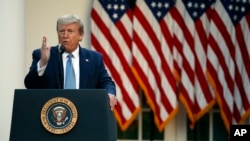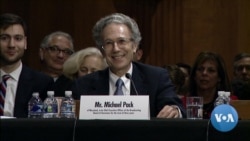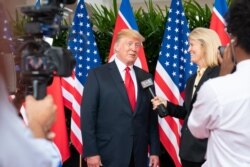U.S. President Donald Trump is threatening to adjourn Congress because lawmakers have not approved his candidates for senior posts in his administration, including his nominee to run the independent agency overseeing the Voice of America.
“I have very strong power,” Trump declared Wednesday, referencing language in the second article of the U.S. Constitution that allows a president “on extraordinary occasions” to adjourn either or both chambers of Congress.
"The Senate should either fulfill its duty and vote on my nominees or it should formally adjourn so I can make recess appointments," Trump said. "We have a tremendous number of people that have to come into government. And now more so than ever before because of the virus and the problem.”
The Constitution requires nominees to a number of senior administration posts to be confirmed by a majority vote in the Senate. However, on occasions when Congress is not in session, the president may make a “recess appointment,” which expires if the candidate has not been confirmed by the end of the next full session.
No president has ever exercised the specific authority to adjourn Congress in Article II, Section 3 of the Constitution.
"Perhaps it’s never been done before, nobody’s even sure if it has," Trump said during a Rose Garden briefing on the coronavirus pandemic. "But we’re going to do it. We need these people here. We need people for this crisis, and we don’t want to play any more political games.”
Documentary filmmaker Michael Pack, whom Trump has selected to run the U.S. Agency for Global Media, is one of 15 key nominees awaiting confirmation by the Senate. Trump cited Pack by name (but erroneously identified the body he would head as USAGM’s predecessor agency, the Broadcasting Board of Governors).
The president also noted his nominees for director of national intelligence, two members of the Federal Reserve Board and the undersecretary of agriculture responsible for administering food security programs as among those yet to be confirmed. Trump blamed the delay on Democrats, accusing the opposition party of “a concerted effort to make life difficult."
“The current practice of leaving town while conducting phony pro-forma sessions is a dereliction of duty that the American people cannot afford during this crisis,” the president said. “What they do, it’s a scam and everybody knows it.”
Pack’s nomination has “been stuck in committee for two years, preventing us from managing the Voice of America — very important,” the president said. “And if you heard what’s coming out of the Voice of America, it’s disgusting. The things they say are disgusting toward our country. And Michael Pack would get in and do a great job, but he’s been waiting for two years — can’t get him approved.”
VOA responds
VOA management, in a response Wednesday evening, rejected Trump’s criticism.
“For more than 75 years VOA has followed its mission of telling America's story overseas and of bringing objective, fact-based information to places around the world that have no other access to it. As we have long said, we export the First Amendment,” said VOA Director Amanda Bennett in a prepared statement.
“I believe in that mission. And, judging from the way our audiences are surging to us seeking information they can rely on in this coronavirus crisis, the world believes in our mission. It's hard work, and it's important work, perhaps more than ever before.”
In a subsequent email to VOA’s employees, Bennett added: “We have a lot of work to do. It's hard work and it's important work. Let's not get distracted from the job in front of us.”
Bennett was appointed to her position in the previous administration of Barack Obama and has been in the post for four years — a relatively long tenure for a VOA director. The veteran journalist and Pulitzer Prize recipient is the agency’s 29th director in 75 years.
The White House launched an attack on VOA last week, which The New York Times termed “a bizarre broadside.”
China coverage at issue
Trump’s social media director, Dan Scavino Jr., said American taxpayers were paying for China’s “very own propaganda, via the U.S. Government funded Voice of America.” As an example, he cited a posting on VOA’s Twitter account of an Associated Press video. The video showed a light show in Wuhan marking last week’s reopening of the city where COVID-19 was first detected.
Hours later, the White House, in its digital “1600 Daily,” accused VOA of creating graphics “with Communist government statistics to compare China’s coronavirus death toll to America’s.” In fact, VOA uses a widely respected tally by Johns Hopkins University to track coronavirus cases and deaths around the world.
“V.O.A. too often speaks for America’s adversaries — not its citizens,” the White House post read.
The New York Times remarked that “the charges hurled at the 75-year-old broadcaster seemed so overheated that some readers worried that hackers had infiltrated the White House’s networks.”
Bennett responded to last week's criticism with a prepared statement noting that VOA is “thoroughly covering China’s disinformation and misinformation in English and Mandarin and at the same time reporting factually.” She added that VOA “has thoroughly debunked much of the information coming from the Chinese government and government-controlled media.”
Pack, if confirmed, would take over from Grant Turner, who is serving as the USAGM CEO on an interim basis, following the resignation of John Lansing, who was an Obama appointee.
Lansing was selected last September by the corporate board of National Public Radio to become NPR’s CEO.







